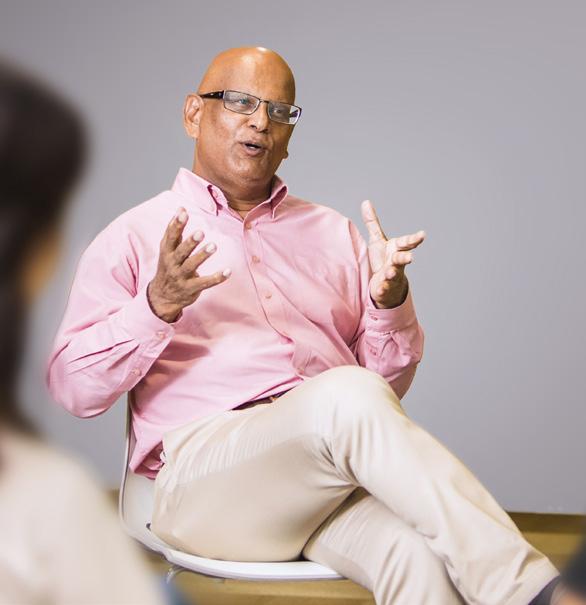
14 minute read
EMPOWERING OTHERS BY WALKING THE JOURNEY
When Mr Ellil Mathiyan was first diagnosed with both rectal and testicular cancer in March 2011, his family did not notice a change in his cheerful demeanour at family gatherings.
Advertisement
It was not an easy journey for Mr Ellil, now 60. He had surgery at Changi General Hospital (CGH) to remove his rectum and underwent 28 radiation treatment sessions and eight chemotherapy cycles, before he was declared cancer-free nine months later. Just as he completed the arduous treatment, he was greeted with another challenging piece of news. He would have to wear a stoma bag for the rest of his life to collect stool through an artificially created hole in his abdomen.


“It was a big blow to me. I had to learn how to live with such a permanent change to my body,” he recalled.
The importance of support
Determined to deal with the change, he looked online for information on stoma care and found a UK-based online support group with fellow cancer survivors who shared useful tips and information with one another. He started looking for local groups that could offer the same support, and a chance encounter with a fellow colorectal cancer survivor at the National Cancer Centre (NCCS) led him to the SGH Colorectal Cancer Support Group (CCSG).
Mr Ellil speaking to patients at a support group meeting.
IT MEANS A LOT TO MEET OTHERS WHO ARE GOING THROUGH THE SAME CHALLENGES AS YOU. Mr Ellil Mathiyan ‘‘ ‘‘
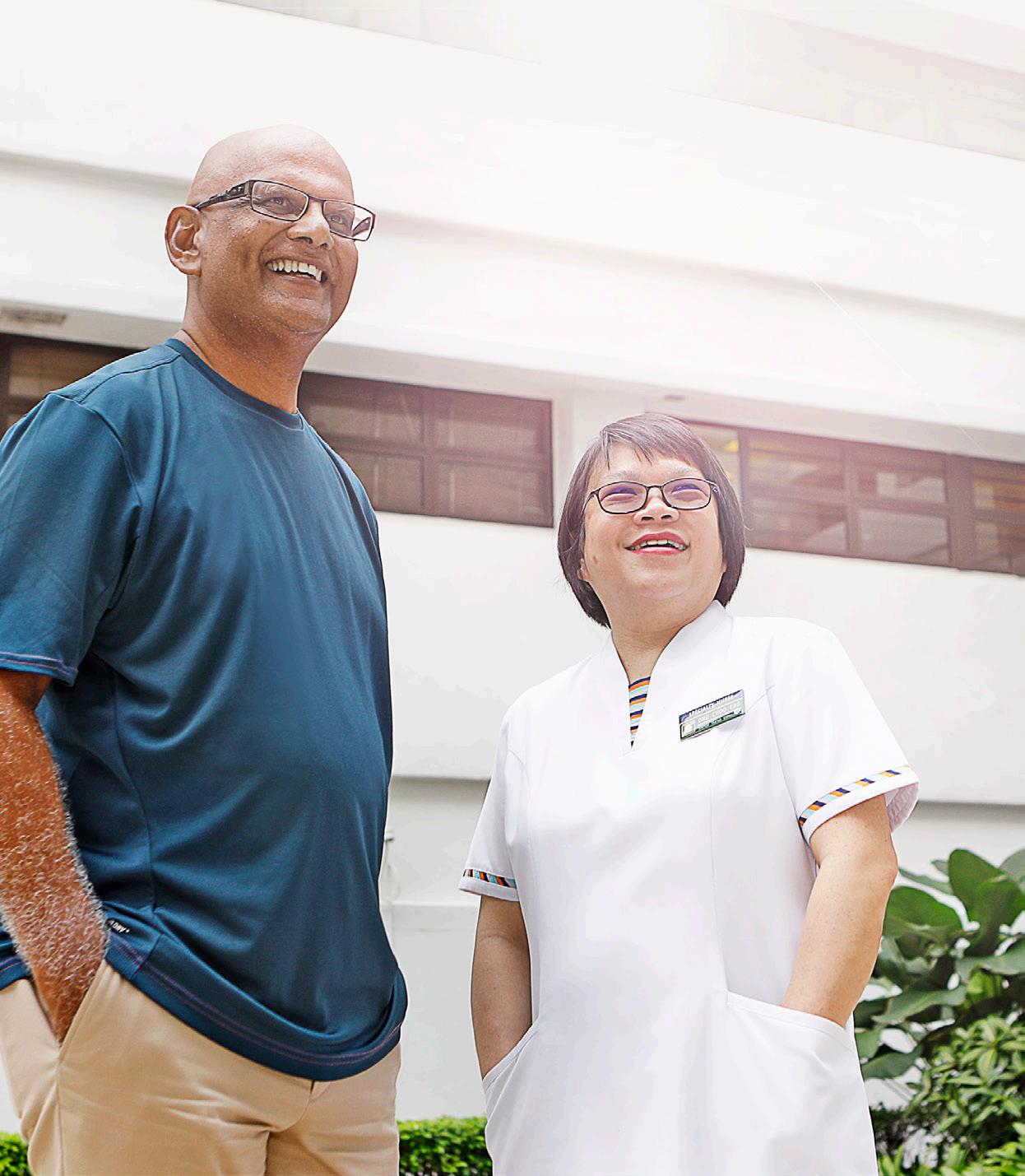
Mr Ellil and Senior Nurse Clinician Ong Choo Eng, who is the Nurse Lead of the SGH Colorectal Cancer Support Group (CCSG)
It was also through the support group that he met Senior Nurse Clinician Ong Choo Eng, who is the Nurse Lead of the group. As a stoma nurse, Sister Ong gave him valuable post-surgery care tips, including how to prevent parastomal hernias -- a common complication in people who have undergone colostomies (surgery to remove the rectum). From Patient to Patient Advocate
It came as no surprise to Sister Ong that Mr Ellil signed up to become a Patient Ambassador of the CCSG. After all, he was already a regular face at the group’s monthly gatherings. As a Patient Ambassador, he visits wards to talk to patients undergoing treatment and shares his experiences dealing with the side effects of chemotherapy and adapting to the resulting lifestyle changes. He also lends a listening ear to those who need a friend, such as Mr Tan Beng Hua, who had six lymph nodes removed due to cancer.
“Ellil has shown me that there are people with cancer who have survived and even thrived. Seeing him bustling around so healthy and lively gives me hope that my life will improve for the better too,” said Mr Tan.
In early 2017, Mr Ellil was nominated by Sister Ong to join the SingHealth Patient Advocacy Network (SPAN), a platform for patients and caregivers to work with hospital staff to improve patient care. SPAN members participate in focus group discussions and engage healthcare providers to improve different aspects of patient care. Mr Ellil currently co-chairs SPAN with a fellow patient advocate.

SEEING HIM BUSTLING AROUND SO HEALTHY AND LIVELY GIVES ME HOPE THAT MY LIFE WILL IMPROVE FOR THE BETTER TOO. Mr Tan Beng Hua, support group member ‘‘ ‘‘
Mr Ellil and Mr Tan Beng Hua at a monthly support group gathering.

“SPAN members, like Mr Ellil, lend their voices to the design of care delivery processes and help to ensure that what matters to patients is taken into account,” said Adj Assoc Prof Tracy Carol Ayre, Group Chief Nurse, SingHealth, who is a SPAN advisor. “We
have greatly benefitted from their input in developing the Nursing Software Suite, which will be used to educate patients and caregivers about their condition through a bedside tablet and mobile app, empowering them to be a part of their recovery process.”
Different activities like line dancing are organised for the monthly support group gatherings.

Mr Ellil and his fellow SPAN members have given input on wayfinding around SGH and have tested an appointmentmaking chatbot prototype that the National Dental Centre (NDCS) is planning to launch. They will also be involved in future projects to improve patient experience.
“We can empower patients and caregivers to engage constructively with healthcare professionals and be more involved in their own care. For healthcare professionals, it’s a reminder to always have the patients’ needs in mind,” said Mr Ellil.
Mrs Tan-Huang Shuo Mei, Group Chief Communications Officer of SingHealth and advisor to SPAN, agreed, “The partnership between SPAN and healthcare professionals creates a ‘space’ for new conversations, which pulls back the veil on areas in healthcare that must change in the evolving healthcare landscape. This allows
good ideas to benefit more patients and caregivers.”

Letting others know they are not alone
Since his struggle with cancer, Mr Ellil knows not to take life for granted.
“The possibility of a relapse is always there,” he said. “Because of this uncertainty, I want to do something meaningful in the remaining years of my life.” Mr Ellil now spends up to four days a week volunteering at support groups, SPAN and other events.
Darren said proudly, “He has always been our fun-loving uncle, and now he shares his infectious enthusiasm with even more people.”
Mr Ellil hopes that through his actions, people who have been newly diagnosed with cancer will know that while it is natural to feel despondent, there is support and they are not alone. “Whatever problem you have, there will always be someone to hold your hand and walk the journey with you,” he said.
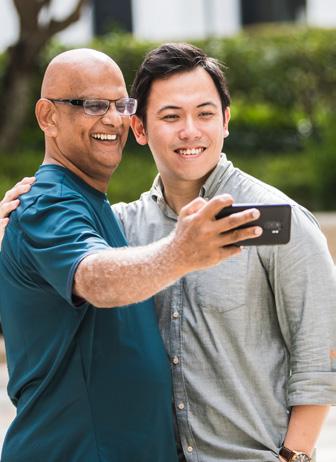
Mr Ellil with his nephew Mr Darren Ching (right), who is proud of the way his uncle has overcome many setbacks.
EMPOWERING PATIENTS
Today’s healthcare is focused on delivering care in ways that matter to our patients and caregivers. At SingHealth, we value the voices of our patients. Patients and caregivers have become key partners in the care journey and play active roles in improving the quality of care.
Patient Support Groups
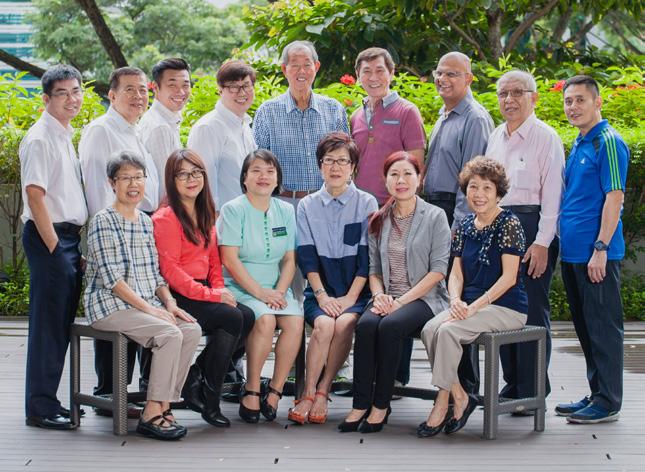

In addition to the care teams, patient support groups are excellent sources of information and support for patients. Members share their first-hand experiences of the disease condition, treatment and coping strategies. The support of patient-to-patient networks relieves the emotional burden on patients and caregivers. Support groups have proven to be an integral part of patient empowerment.
The SGH Colorectal Cancer support group.
The Revival Connection, a support group from NCCS for patients with advanced and recurrent cancer.

ESTHER Network Singapore
Launched in 2016, the ESTHER Network Singapore aims to promote the philosophy of person-centred care by always asking “What is best for Esther?”, drawing inspiration from the ESTHER Network which started in Sweden. Esther symbolises a patient whose health and social care needs require close coordination across different care settings. The Network seeks to improve care delivery processes and coordination among hospitals, intermediate and longterm care (ILTC) agencies, voluntary welfare organisations (VWOs) and general practitioners (GPs) to better serve our Esthers.
The Network has trained more than 190 ESTHER coaches comprising healthcare and community care professionals. These coaches have initiated various projects, which include ESTHER Cafés, where patients are invited to share their care journey experiences. With their feedback, ESTHER coaches identify areas for improvement and start projects to increase the competence of the whole care continuum.
SingHealth Patient Advocacy Network (SPAN)
Established in 2017, the SingHealth Patient Advocacy Network (SPAN) is a self-driven network of patients and caregivers that represents the voice of patients. Working in partnership with the healthcare team, SPAN provides important patient perspectives and plays an active role by giving inputs on how SingHealth can improve the patient experience.
“Involving the voices of patients calls for a fundamental rethink of our current care model, and SPAN is the bridge between patients and the healthcare team,” explained Prof Tan Kok Hian, Group Director, Institute for Patient Safety & Quality (IPSQ), SingHealth.
To help members be effective patient advocates, SPAN has also initiated the Patient Advocacy Communication Training (PACT), which is slated to commence in the second half of 2019.
“Through the PACT programme, we want to empower Patient Advocates to give their perspectives on proposed initiatives and equip them with the skills to communicate their input,” Prof Tan added.
Key Milestones and Events for SPAN
Mar 2017
SPAN is established.
Mar 2018
May 2018
Oct 2018
Dec 2018
SPAN members invited to evaluate and share feedback on the concept model of the NDCS-OST Appointment Chatbot.
SPAN members participate in Mobility-X focus group discussions to give input on solutions that enhance the travel experience into and out of the SGH campus.
SPAN member appointed to Singapore Health Quality Service Awards Judging Panel.
SPAN member serves as panelist at Patient Safety Day 2018.

SPAN co-chairs appointed.
Feb 2019
Mar 2019
Official launch of SPAN at the inaugural SPAN Partnersin-Care Forum 2019 with more than 150 participants.
SPAN member serves as judge at SingHealth Hackathon, evaluating healthcare solutions to help Singaporeans to keep well, get well and age well.
SPAN member invited to speak on Patient Engagement at SingHealth Quality and Innovation Day 2019. SPANtastic Theatre, made up of SPAN members, act out examples of patient and doctor interactions in a skit.
WORKING TOGETHER FOR BETTER HEALTH
Being unable to play your favourite sport can be a big blow if your life revolves around it. When his doctor stopped him from playing competitive rugby after he sustained multiple injuries and tore two neck ligaments in 2011, Mr Toh Kiat Sheng gradually lost the discipline to exercise.
His physical health began to deteriorate and his weight increased from 80 kg to 120 kg as he started binge-eating for comfort. A 5-minute walk made him breathless, which further affected his self-esteem.

Mr Toh and his father, both engineers, at work. His father encouraged and supported him to get fit and healthy.
When his father alerted him that the skin around his neck was starting to turn dark - a possible sign of diabetes, Mr Toh went to Tampines Polyclinic for consultation and advice. The Polyclinic referred him to the Weight Management Programme at the SingHealth Duke-NUS Sport & Exercise Medicine Centre (SDSC) at Changi General Hospital (CGH). He roped in his older brother, Mr Toh Kiat Boon, and together the two siblings started on the programme.
Personalised care from a multidisciplinary team
Both brothers found the multidisciplinary care highly effective in helping them develop a holistic weight management plan tailored to their lifestyles. The younger Mr Toh was introduced to a team comprising Dr Leonard Lim Ang Tee, a Sport and Exercise Medicine Consultant at CGH, Ms Miko Yeo, a dietitian, and Mr Zack Teng, an exercise physiologist.


The team worked hand-in-hand to ensure that the advice they gave Mr Toh was relevant to his specific healthcare needs. “We work closely as a team and have regular update sessions on each patient’s progress to see how we can help them achieve their goals,” said Dr Lim.
One example of the healthcare team personalising the care plan to suit Mr Toh’s lifestyle was when dietitian Ms Yeo asked him to keep a food diary for a few days before working with him to come up with a customised diet plan. Ms Yeo said, “Looking at his food diary, I saw that he enjoys meat and rice dishes so I suggested healthier alternatives like stir fried meat dishes, with half a bowl of brown rice. That way, he still gets to enjoy what he likes, but with a lower calorie intake.“
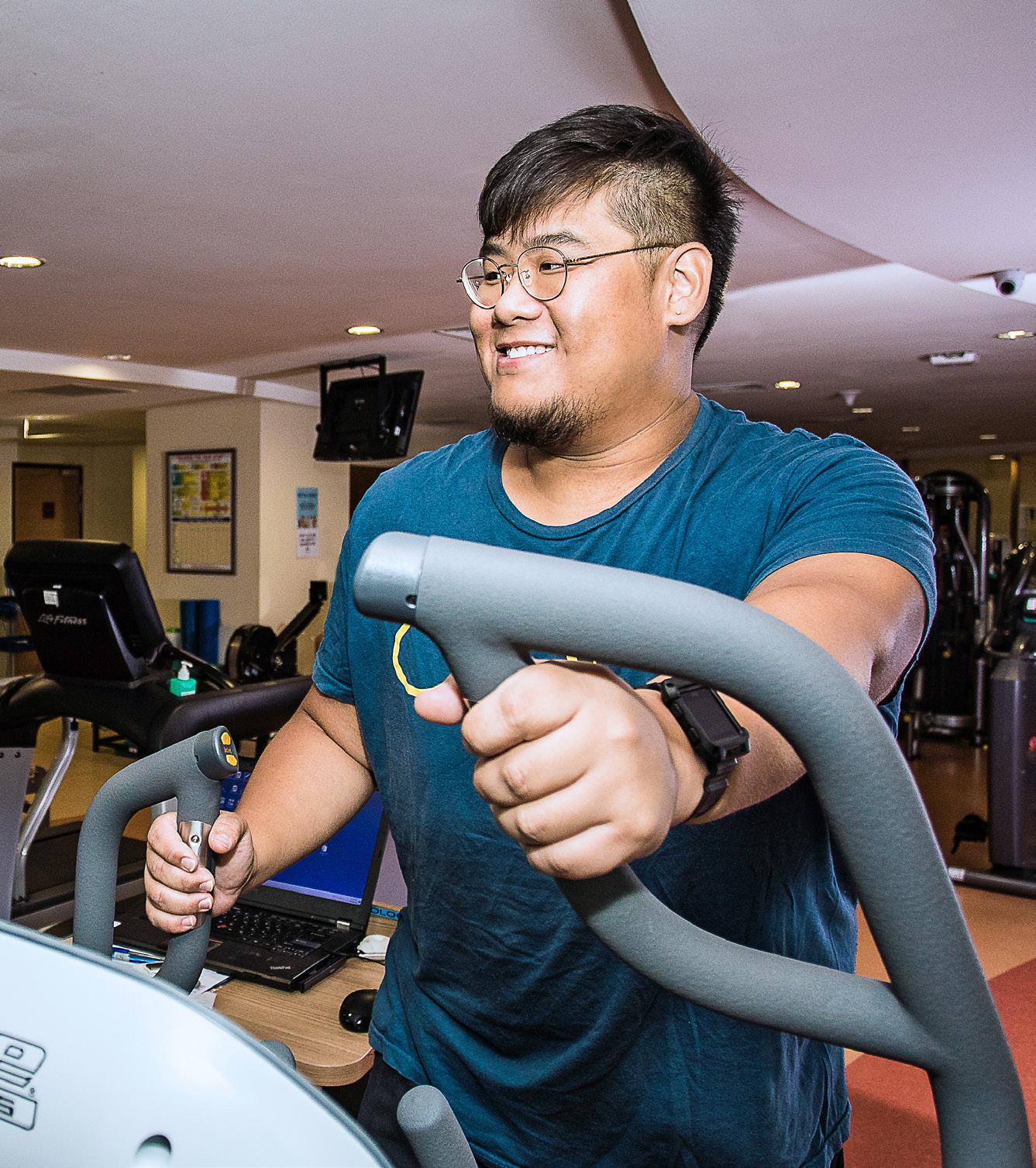
YOU JUST HAVE TO DIG DEEP AND FIND THE DISCIPLINE TO GET HEALTHY AND STAY WELL. Mr Toh Kiat Sheng ‘‘ ‘‘
WE WORK CLOSELY AS A TEAM AND HAVE REGULAR UPDATE SESSIONS ON EACH PATIENT’S PROGRESS TO SEE HOW WE CAN HELP THEM ACHIEVE THEIR GOALS. Dr Leonard Lim Ang Tee, Sport and Exercise Medicine Consultant at CGH ‘‘ ‘‘
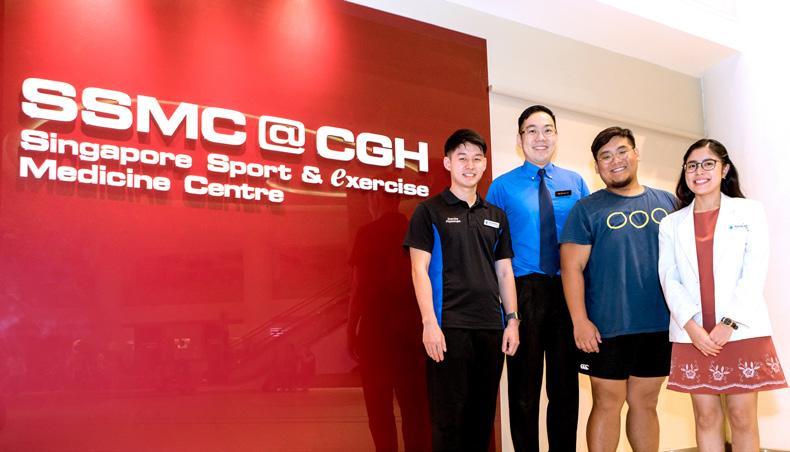

Mr Toh with his multidisciplinary care team. STANDING STRONG
Similarly, exercise physiologist Mr Teng formulated an exercise regime that Mr Toh was able to do and was comfortable following. “We used Mr Toh’s knowledge of physical training from his rugby days to come up with a suitable exercise regime. This allowed him to better identify with the exercises, thereby facilitating better continuity and adherence,“ explained Mr Teng. Along with the diet and exercise plans, Dr Lim regularly assessed Mr Toh’s medical condition and kept a close eye on his progress to make sure he was exercising safely and effectively.
The nine SingHealth Duke-NUS Disease Centres (SDDCs) are models of care that leverage the resources of the cluster for patients with specific conditions who require multidisciplinary care. Adj Assoc Prof Benedict Tan, Head of the SDSC and Chief of the Sport and Exercise Medicine Department at CGH, said, “CGH is not the only SingHealth facility that offers comprehensive weight management programmes. SGH Life Centre, KKH and others have such
Exercise physiologist Zack Teng keeps a close eye on Mr Toh’s physical fitness.
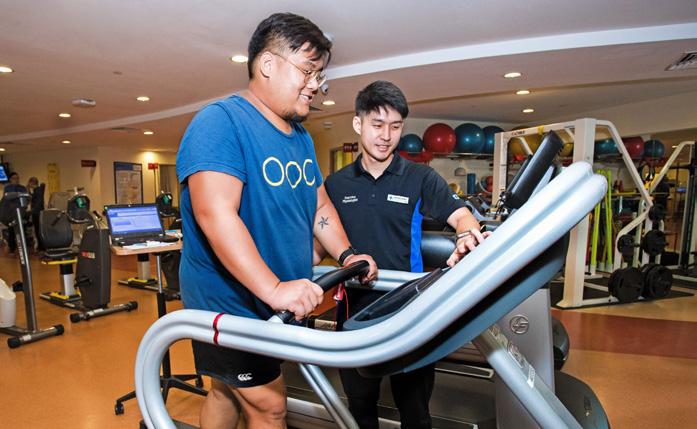
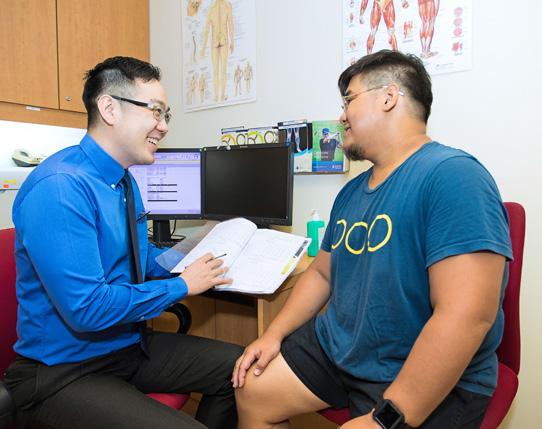
Mr Toh goes for regular follow-ups where he sees Dr Leonard Lim and other members of the care team in one visit.
capabilities as well. If the overweight patient is in his teens, then he would be referred to KKH. If the overweight patient has poorly controlled diabetes, he would be referred to an endocrinology-led programme like the one at SGH Life Centre,” explained Adj Assoc Prof Tan. Empowering patients to take charge of their health
Weight management requires a lifelong commitment to lifestyle changes and patient involvement is critical. As education is key to empowering patients to make the right choices, the SDSC team focuses on equipping patients with resources and tools to lead a healthier lifestyle, after their discharge from the 6-month weight management programme.
For example, Ms Yeo makes it a point to teach patients how to read food labels and select food products with essential nutrients. She also shares useful websites which have reliable educational materials.
“Before the programme, I relied on what I found on the internet and didn’t really know where to get accurate information. At first, I wanted to go on a no-carbohydrate diet but thankfully, the dietitian suggested a safer alternative and gave me information to help me do it. The best part is having healthcare professionals who help and empower me to make the right decisions. These are tools I can use for the rest of my life.” Mr Toh said.
Along with a caring father who accompanies him for evening walks and gets rid of unhealthy snacks around the house, feeling fitter and healthier has served as Mr Toh’s motivation. He has lost more than 30 kg since enrolling on the weight management programme and now takes a daily walk to and from work every day without feeling breathless.


Having been deeply involved in his own care journey, Mr Toh knows the importance of being empowered and supported to keep well and stay healthy. Yet, he admits it can be an uphill struggle to embark on the journey to health.
THE BEST PART IS HAVING HEALTHCARE PROFESSIONALS WHO HELP AND EMPOWER ME TO MAKE THE RIGHT DECISIONS. THESE ARE TOOLS I CAN USE FOR THE REST OF MY LIFE. Mr Toh Kiat Sheng ‘‘ ‘‘
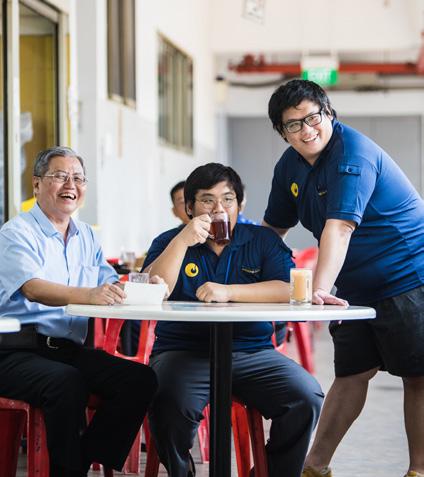
With support from their father (left), Mr Toh and his brother (right), have made great strides in their journey to health.

